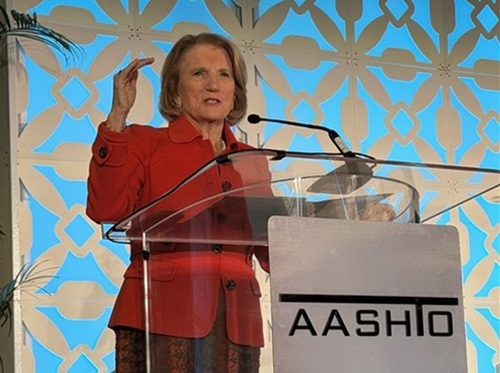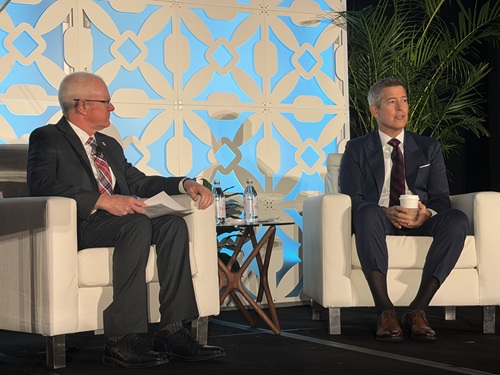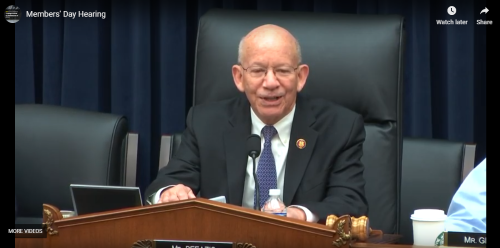The annual May 1 “Member Day Hearing” held by the House of Representatives Transportation and Infrastructure Committee generated a broad range of commentary on everything from multi-year reauthorization of surface transportation funding to workforce development tactics and the need for the Essential Air Service program to keep rural airports active and operational.
[Above screen capture via YouTube of Rep. Peter DeFazio, chair of the House T&I Committee. overseeing “Member Day” testimony.]
“I strongly support this committee providing a multi-year reauthorization bill that addresses the pending insolvency with the Highway Trust Fund,” noted Rep. Tom O’Halleran, D-Ariz., in his testimony – a common topic among the members participating in the hearing.

“In its current state, the Highway Trust Fund will run out of money in 2021, which will force Arizona to severely cut its expenditures and negatively impact its ability to respond to emerging needs in 2022,” Rep. O’Halleran said. “A long-term authorization measure will allow Arizona and other states to strategically plan critical infrastructure projects.”
He added that “bringing back flexibility” to Highway Safety Improvement Program Funds is another key transportation need.
“As the law requires, program funds can only be spent on infrastructure construction projects,” Rep. O’Halleran explained. “However, allowing the funds to be used on education and safety enforcement programs will also help reducing highway injuries and fatalities.”

He noted that allowing state transportation departments to transfer funds between programs to meet emerging needs would also “give states another tool when meeting budget constraints.”
Rep. O’Halleran also called for changing federal law that prohibits commercial activities on interstates built after January 1, 1960. “This unfair prohibition negatively affects highway systems in Western states more because their highways were developed later in time than in the East,” he said. “By fixing this problem Congress puts all states on equal footing and creates another tool to help meet the construction and maintenance needs of rest areas.”

Rep. Glenn Thompson, R-Penn., touched on another common theme expressed generally in member testimony: developing ways to help the nation’s transportation industry recruit and retain a skilled workforce, which is a key emphasis area for Carlos Braceras, executive director of the Utah Department of Transportation and 2018-2019 president of the American Association of State Highway and Transportation Officials.
“Rebuilding our nation’s infrastructure will require more than just bridges, roads, and waterways; it will require the development of a skilled workforce that can design, build, and maintain that infrastructure,” Rep. Thompson said in his testimony.
“Career and Technical education programs and apprenticeships are proven strategies that can provide individuals with the education and work-based learning needed for career success in these high-skill, high-wage industry sectors or occupations,” he added.

“By including these investments in a comprehensive infrastructure package, we will ensure that resources committed to our nation’s infrastructure will be effective, building on established workforce development strategies to provide the skilled workers required to carry out the projects,” he said.
Rep. Thompson also highlighted the need to maintain the Essential Air Service program that subsidizes commuter and certified air carriers.
“This program is critical in rural America and has provided links to hub airports at over 175 locations throughout the United States and its territories that would otherwise lack commercial air service,” he pointed out.

“Our nation’s rural and small communities depend on commercial air service for transportation, medical supplies, commercial goods, and access to larger business markets,” Rep. Thompson added. “By continuing regular air service to these areas, Americans will continue to access necessary medical services that might only be available in larger cities, as well as increasing the economic opportunities and visitors to these communities.”
Rep. Roger Marshall, R-Kan., touched on water infrastructure and broadband in rural areas in his testimony – two areas many other members touched on in their remarks.

“In addition to surface transportation, water infrastructure is of vital importance to my district, whether through availability of quality water sources, or upgrading the aging water towers, levees, and dams, as well as underground pipes in many municipalities across my state,” he said. “Furthermore, flood mitigation efforts through preservation and maintenance of levees, locks, and dams will protect homes and businesses while allowing communities to expand and invest in new development.”
And while “broadband is not within the jurisdiction” of the House T&I Committee, Rep. Marshall emphasized that “any infrastructure package should include broadband” in the conversation.
“The high cost of broadband deployment coupled with a low population and vast expanses in rural America makes infrastructure deployment challenging and expensive for many communities,” he emphasized. “Yet our society continues to transition more and more toward digital connections, whether for education, healthcare, or even agriculture, making a reliable and affordable internet access no longer optional.”
 Top Stories
Top Stories
Congressional Leaders Detail Key Transportation Priorities
February 27, 2026 Top Stories
Top Stories

